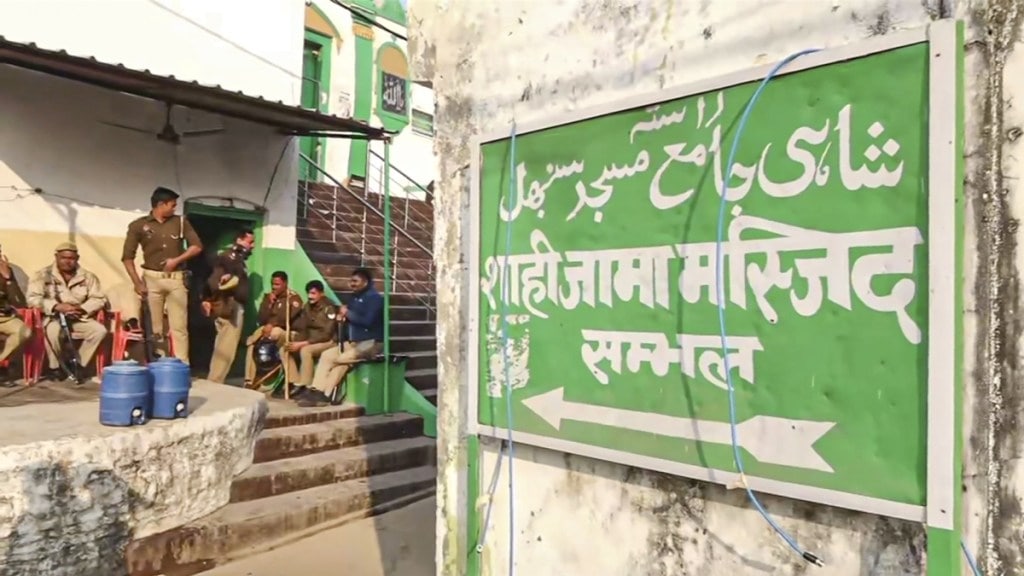The Supreme Court on Friday ordered a temporary halt to proceedings in the Sambhal mosque dispute, instructing a local trial court to suspend its survey of the Mughal-era Shahi Jama Masjid in Chandausi. The court also directed the Uttar Pradesh government to take measures to maintain peace and harmony in the violence-hit town.
On November 19, a civil judge in Sambhal had issued an ex-parte order for a survey of the mosque by an advocate commissioner, following a plea from Hindu petitioners who claimed the mosque, built by Mughal emperor Babur in 1526, was constructed after demolishing a temple.
Violence erupted in the area on November 24 after the court’s order, resulting in the deaths of four people.
The Supreme Court, in its order, emphasized the need for peace in Sambhal district and instructed that the survey report prepared by the court commissioner be sealed and not opened until further notice. The court also directed that the Shahi Jama Masjid Committee’s petition against the survey order be listed before the Allahabad High Court within three working days.
“We feel that the petitioner (mosque committee) must challenge the order dated November 19, 2024, in an appropriate forum. In the meantime, peace and harmony must be maintained. The Additional Solicitor General (KM Natraj appearing for the state government) assures the same. We also observe that in case any revision petition/miscellaneous petition is preferred, the same would be listed within a period of three working days,” Chief Justice Sanjiv Khanna wrote in the order.
The court noted that the case was scheduled for January 8, 2025, in the trial court but clarified that the proceedings should not continue until the matter is heard in the High Court.
“We hope and trust the trial court will not proceed with the matter till the matter is listed before the High Court. We clarify we have not expressed any opinion on the merits of the matter. We are not disposing of the present special leave petition. Re-list (it) in the week commencing January 6,” the order read.
Earlier in the day, the Sambhal court had instructed the court-appointed commissioner, Rakesh Singh Raghav, to submit the survey report within 10 days.
Senior advocate Huzefa Ahmadi, representing the mosque committee, urged the Supreme Court to intervene, arguing that the trial court’s order could “cause great mischief.”
At the outset, Chief Justice Khanna questioned why the plea was moved directly in the Supreme Court and advised the committee to approach the High Court for legal recourse.
The bench, however, suggested that the mosque committee seek relief under Article 227 of the Constitution, which provides the High Court with supervisory powers over lower courts. “We may have some reservations on the order, but is it not amenable to Article 227? You have to approach the appropriate forum,” the CJI observed.
The bench expressed concern about community harmony, with the Chief Justice stating, “Peace and harmony have to be maintained. We don’t want anything to happen…we have to be absolutely, totally neutral and ensure nothing wrong is done.” The court also called for the formation of a peace committee with representatives from both communities, which would be overseen by the state administration.
Additional Solicitor General KM Nataraj assured the bench that the state was committed to maintaining peace in the region.
The management committee of the Shahi Jama Masjid filed the appeal on November 28, challenging the November 19 order of the district court, which had directed the mosque’s survey. The petitioners sought an ex-parte stay on the execution of the order.
Tensions had flared in Sambhal after the November 19 court order, which followed claims that a Harihar temple once stood at the site of the mosque. On November 24, clashes broke out between protesters and security personnel near the mosque, leading to stone pelting, arson, and the deaths of four people.
(With PTI inputs)

